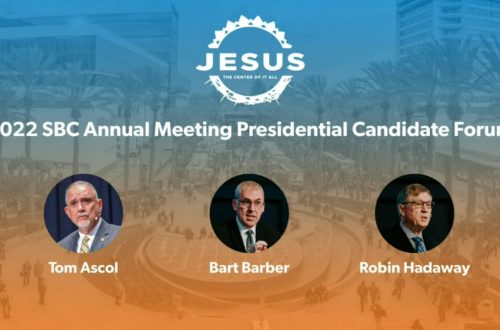 I attended the annual meeting of the Evangelical Theological Society (ETS) last week in San Antonio. There was much that happened there, but of course the focus of much attention was the conference theme—the Trinity. For me, the most significant thing that happened was on day one in the session that featured Kevin Giles, Bruce Ware, Millard Erickson, and Wayne Grudem. While the plenary addresses tended not to address the EFS controversy, this particular session confronted it head-on.
I attended the annual meeting of the Evangelical Theological Society (ETS) last week in San Antonio. There was much that happened there, but of course the focus of much attention was the conference theme—the Trinity. For me, the most significant thing that happened was on day one in the session that featured Kevin Giles, Bruce Ware, Millard Erickson, and Wayne Grudem. While the plenary addresses tended not to address the EFS controversy, this particular session confronted it head-on.
The debate was direct and even heated at times, especially in the panel discussion. But in my view the most important thing that happened was Ware’s and Grudem’s unambiguous affirmation of eternal generation. Before now, neither of them had outright rejected the doctrine, but they had questioned its biblical basis. Grudem in particular has an entire appendix in his Sytematic Theology arguing that the term MONOGENES does not mean “begotten.” Ware and Grudem both revealed that they are now persuaded that the Bible teaches the doctrine, and that the eternal relations of origin constitute the personal distinctions between Father, Son, and Holy Spirit.
Ware had already made this affirmation previously, but his paper really provided the first glimpse of how this shift affects his view of the Son’s submission to the Father in eternity. In short, Ware argued that the Son’s submission to the Father is a consequence of the eternal relations of origin. Grudem’s affirmation was even more dramatic as he had never signaled such a clear shift in his views before his presentation. Grudem shared that an unpublished paper by Lee Irons persuaded him that the Nicene Fathers were right in their interpretation of MONOGENES—a Johannine term that is a linchpin for the Nicene doctrine of eternal generation (John 1:14, 18; 3:16, 18; 1 John 4:9). Grudem also revealed that he intends to revise his Systematic Theology in order to reflect this change.
Grudem’s and Ware’s affirmation of eternal generation did not shut down all discussion. There were still important differences among the panel members that came out during the discussion at the end. Erickson and Giles do not believe that the Son submits to the Father in eternity in any sense. Ware and Grudem clearly still do, although they stipulated that it happens as a consequence of eternal generation and in a way that does not divide the single divine will.
Again, important differences among the panelists were still there and are certainly worth further discussion and debate. Still, I think it is crucial not to miss the forest for the trees. The story of this ETS as it relates to debates last summer is that Ware and Grudem have offered unambiguous affirmations of eternal generation, and that is a good thing.
There was a great irony on the panel that may have gone unnoticed by many viewers. Kevin Giles excoriated Grudem and Ware for their failure to affirm eternal generation (Giles read first and found out that his criticism no longer applied), but he did not criticize Erickson at all for his failure to affirm the same. Erickson does not believe in the doctrine of eternal generation, yet somehow this did not register in Giles’s disapproval. Also, Giles himself disagrees with the Nicene Fathers’s interpretation of MONOGENES. Giles affirms eternal generation but not this crucial exegetical basis for it that is cited in the Nicene Creed. The irony: Neither Giles nor Erickson agree with the Nicene Creed’s interpretation of MONOGENES, and Erickson fails to believe in eternal generation at all. Ware and Grudem both affirm the Creed’s use of MONOGENES, and they both affirm eternal generation.
One final word about the role Lee Irons played in all of this. As I mentioned, Grudem changed his view based on Lee Irons’s work. Last summer when I wrote my “Take-Aways from the Trinity Debate” post, I noted that I intended to write and publish an article on MONOGENES. After writing that post, a friend contacted me and told me that Lee Irons had presented a paper on MONOGENES at a regional meeting of ETS a couple years ago. I contacted Lee and asked if he would share his paper with me, and he did. Let me just say that Lee’s paper is a tour de force, and I don’t think there is any need for me to publish an article on this. Lee has done an extensive analysis of the term, including an exhaustive search of the TLG database. Lee shows beyond a shadow of a doubt that MONOGENES—in both John’s writings and in the Creed—denotes the idea of generation.
I cannot overstate the importance of Lee’s article. In my view, its publication will force a revision of BDAG and a raft of modern English translations of scripture, nearly all of which mistranslate MONOGENES as “unique” or “only.” It turns out that the King James translators had this right. MONOGENES means “only-begotten,” and those who miss that may be missing something crucial about the Trinity.
————-
UPDATE: Lee Irons has posted a summary of his unpublished paper at The Gospel Coalition website. Obviously, there is much more to his argument than what is included in a single blog post. Still, you can see the broad outlines of his work there. I should also mention that the paper that convinced Grudem is two years old. Lee has collected even more evidence and data since 2014, and the case for “only-begotten” has gotten even more compelling as a result.



